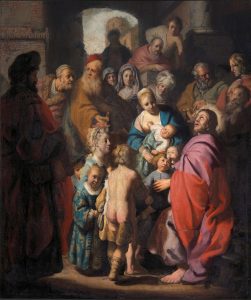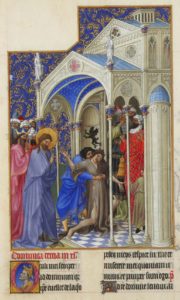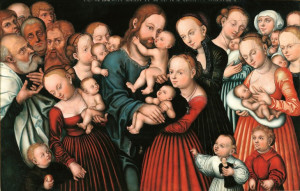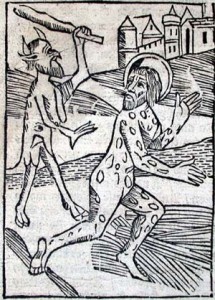Thoughts on Sunday’s Lessons for Sept. 29, 2024 (Pentecost 19B/Proper 21)
Season of Creation: Bless Sunday

Jesus with the little children (1620s), partially restored painting possibly by Rembrandt Harmenszoon van Rijn (1606-1669) or by Jan Six I (1618-1700). Private collection. (Click image to enlarge.)
First Reading (Track One): Esther 7:1-6, 9-10; 9:20-22
Creation Focus: Plotting death backfires on schemer
There’s something unique about this reading: It offers the only time that the three-year Lectionary draws from the Hebrew Bible’s Book of Esther … and even this is only for those following Track One! This passage comes near the end of this exciting story that, in Jewish tradition, is read in its entirety on the feast of Purim. In these verses Queen Esther of Persia reveals at a banquet feast that she is Jewish and thus would herself be killed with her people if the wicked plotter Haman carried out his plan to kill or enslave all of Persia’s Jews. The king, angry about Haman’s plotting, orders him hanged on a giant gallows, and justice is served. This event is remembered in Jewish tradition with feasting, joy, and gifts of food for each other and the poor.
First Reading (Track Two): Numbers 11:4-6, 10-16, 24-29
Creation Focus: Greed destroys; find contentment
Listen! We listen for the voice of God. We ask God to listen to us when we pray. We listen to each other, and sometimes we hear. Listen for themes of listening and hearing in Sunday’s readings. In our first reading we hear the people in the desert, sick and tired of manna, hungrily remembering the good food they enjoyed in Egypt; so hungry that they would eagerly return to Pharaoh’s slavery for something good to eat. God is angry. Moses is angry! Fortunately, God offers a practical solution: Moses may name seventy elders to help him carry the load of leadership. Then, two men who had remained in the camp started prophesying without supervision! Moses’ assistant Joshua wants them punished, but Moses says no: He wishes that all the people could prophesy and share God’s spirit.
Psalm (Track One): Psalm 124
Creation Focus: Raging waters destroy; follow God’s way to calm them
Remembering another time when Israel feared death at the hands of enemies, Psalm 124 sings joyous thanksgiving for God’s protection, when God parted the waters of the Red Sea when they escaped Pharaoh’s bondage in Egypt. If God had not been on their side when the enemies rose up against them, we sing, the waters would have overwhelmed them! The torrent would have gone over them! But God did not give them up. They escaped, singing, “Our help is in the Name of the Lord, the Maker of Heaven and Earth.”
Psalm (Track Two): Psalm 19:7-14
Creation Focus: Find joy in following God’s good path in Creation
Listen and hear, as we sing this psalm that calls on us to pray and tells us why we should pray. God’s commandments are good, and to follow them does us good, we sing. Sweeter than honey and more desirable than gold, God’s laws and commandments enlighten us and keep us on a straight path. How do we pray? The answer is so important that we repeat it twice: “Let the words of my mouth and the meditation of my heart be acceptable to you, O Lord, my strength, my rock, and my redeemer.”
Second Reading: James 5:13-20
Creation Focus: Pray for Creation’s healing, save each other
As we reach the end of our month long visit with the letter of James, this powerful epistle has called on us to care for our neighbors, to protect the weak, and to do the work that God has given us to do. Now the letter ends with a call to prayer: Are we suffering? Pray! Are we happy? Sing hymns of praise! Are we sick? Ask our friends to pray for us! Prayer works, the author of James says. When we bring our brothers and sisters back to God’s way, we save them from death. God works through us as God worked through the prophet Elijah when the prophet prayed for an end to a killing drought and famine.
Gospel: Mark 9:38-50
Creation Focus: Ally with any who heal Creation; support youth
The Apostle John seems angry and perhaps a little possessive in this Gospel passage. “Teacher, we saw someone casting out demons in your name, and we tried to stop him, because he was not following us,” he yells. We can imagine him running up to Jesus and demanding, “Make him stop! He’s not authorized!” But Jesus isn’t bothered. “Do not stop him,” he tells the apostles, adding, “Whoever is not against us is for us.” Jesus, perhaps using an old rabbinic tradition of contrasting an act with an extreme alternative, goes on with some pretty scary language about staying on the right path or else. But his point is clear: If people are with us, don’t throw them out.



 First Reading:
First Reading: